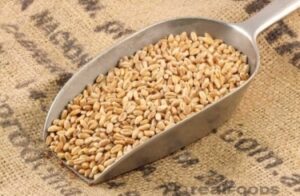
Based on the results of the analysis of export operations with agricultural products, BES analysts found that over 9 months, risky enterprises exported grain of unknown origin for UAH 133.9 billion. This is more than 20% of the total amount.
Currently, the Bureau of Economic Security has submitted its proposals to the Cabinet of Ministers of Ukraine to minimize risks in this sector of the economy.
One of the most common methods of “black” grain exports is the use of risky enterprises. They are set up in advance to export unaccounted-for grain purchased for cash.
In other words, farmers grow grain and sell it for cash to companies that are usually registered to front companies and do not engage in regular business activities.
These companies do not submit documents on the origin of the grain or declare fictitious producers in their customs declarations.
After the grain leaves Ukraine, it is resold several times and then legally reaches the final buyer. As a result, foreign currency earnings do not return to Ukraine, and the budget does not receive any revenues, as the exporting companies are fictitious.
Usually, the final buyer of grain is a non-resident company that transfers the money for the goods to another non-resident company related to a Ukrainian exporter.
There is also a scheme in which foreign currency is transferred to the current accounts of a non-resident, who then buys the goods, for example, in China and imports them to Ukraine to sell them for cash and to give other companies a tax credit.
To counteract offenses in this area, employees of the Economic Security Bureau constantly analyze export operations. Based on the results of such analysis, 43 analytical products and certificates were created, and almost 4,500 orders to initiate inspection (re-inspection) of goods were sent to the State Customs Service. For example, according to the BES in Odesa region, the customs office refused to clear 75 customs declarations totaling 1.6 million tons worth more than $430 million.
As part of 22 criminal proceedings, BES detectives served notices of suspicion to 12 officials of “risky” grain exporters for committing crimes under Articles 212 and 205-1 of the Criminal Code of Ukraine, conducted 71 searches, and sent 12 criminal proceedings to court. The courts have issued 8 indictments.
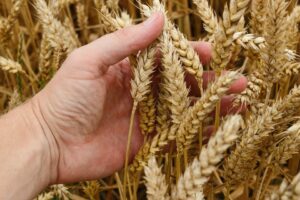
Since the beginning of the Russian aggression, Ukraine has been forced to change the geography of agricultural exports, as a result of which the share of Europe reached 59% in January-October 2023 compared to 32% in 2021, the Ukrainian Agribusiness Club (UCAB) reported on Facebook.
According to the report, such an increase in exports of agricultural products to Europe is forced and is explained by a decrease in supplies to other regions: the share of Africa decreased to 7% from 14%, Asia – to 12% from 19%, and Southeast Asia – to 4% from 13%.
“The main reason for these changes is the blockade of Ukrainian seaports by Russian troops. The development of alternative routes, which were possible only through the territory of the EU countries, led to changes. Ukrainian farmers were forced to look for buyers of their products in Europe,” the analysts explained.
The UCAB reminded that deliveries to Africa and Asia during the war became possible only thanks to the work of the grain corridor in cooperation with the UN and Turkey, as well as the temporary grain corridor, which is currently shipping.
In 2023, the structure of exports of Ukrainian agricultural products in terms of the main export items is similar to last year’s figures: 39% were grains, 26% were vegetable oils, 4% were meat, and 2% were dairy products, eggs, and honey. At the same time, exports of oilseeds decreased to 12% compared to 16% in 2022, while exports of oilcake increased to 6% from 5% during the year. The permission to supply sugar to foreign markets allowed producers to increase its share in agricultural exports to 3% over the year.
In pre-war 2021, the structure of Ukraine’s agricultural exports was as follows: cereals – 45%, vegetable oils – 26%, oilseeds – 9%, meals – 6%, meat – 3%, and tobacco products – 2%.
“The only way to resume exports to Ukraine’s traditional markets is to ensure the safety of sea export routes and increase the volume of shipments through this channel,” the UCAB summarized.
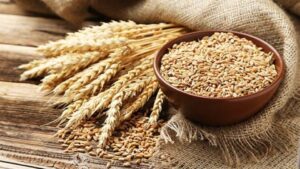
The Ministry of Agriculture and Farmers Welfare of India has included Ukraine in the list of countries that do not treat grain crops with fumigants containing methyl bromide (CH3Br), the State Service of Ukraine for Food Safety and Consumer Protection reported, citing the Embassy of Ukraine in the Republic of India.
“This will make it possible to exempt domestic exporters from paying additional payments (penalties) stipulated by local legislation and export grain cargoes during disinfection with aluminum phosphide-based preparations,” the State Service of Ukraine for Food Safety and Consumer Protection said in a statement on Tuesday.
The agency clarified that Ukrainian grain for export to India should be disinfected with aluminum phosphide-based products only. It is recalled that work to resume exports of Ukrainian grain to India has been underway since 2016.
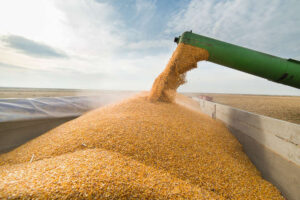
In July-September this year, the cargo turnover of the port of Kolobrzeg increased by 52% due to the resumption of transshipment of Ukrainian agricultural products, the Polish edition of Rynek Infrastruktury reports.
According to the report, Kolobrzeg was not previously included in the Polish government’s resolution on the transit of Ukrainian grain. In the third quarter, the port resumed accepting Ukrainian agricultural products, which helped increase cargo turnover.
In the third quarter, the Polish port handled more than 73 thousand tons of cargo, which is 52% more than in the same period of 2022, when 48 thousand tons were handled. The cargo included grain, logs, limestone, pellets and fertilizers. Grain accounts for half of the transshipment. Among the grains transshipped in Kolobrzeg, corn and barley were the most common.
The port temporarily suspended operations in April this year. Back then, the Polish authorities banned imports of Ukrainian grain but allowed its transit. At first, Kolobrzeg was not on the list of ports that could handle Ukrainian grain, but later the Polish government allowed the company to handle Ukrainian cargo.
“We have demonstrated that we are unpredictable in our actions as a country, so building long-term business relations is perceived as risky, as one decree can turn everything upside down”, said Artur Lievski, head of the port’s administration.
A week after the ban was imposed by the Polish government, the mistake was corrected: Kolobrzeg was included in the list of seaports through which grain can be transited from Ukraine. However, it took a long time to restore trust, and for some time no freight trains with Ukrainian products arrived in Kolobrzeg. After a three-month break, the first train with corn from Ukraine arrived at the seaport of Kolobrzeg in late July, the newspaper said.
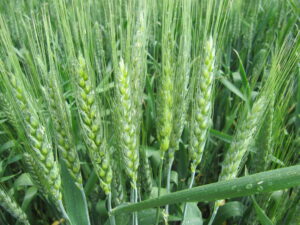
In early October, IMC Agro Holding completed sowing of winter wheat for the 2024 harvest on 20.3 thou hectares, the company’s press service reported on Facebook.
According to the report, the warm and dry weather in September allowed IMC to sow all the planned areas with winter wheat, and the precipitation in the second decade of October helped to get friendly winter shoots.
In addition, at the end of the second decade of October, the agroholding completed threshing sunflower on an area of 32.1 thou hectares, harvesting 92.7 thou tons with an average yield of 2.9 tons/ha.
At the same time, the yield on the land in the north of Chernihiv region, which was not cultivated last year due to the occupation and the subsequent need to inspect for explosive devices, amounted to 2.2 tons/ha. On the rest of the IMC areas in Chernihiv, Sumy and Poltava regions, the sunflower yield amounted to 3.3 tons/ha.
“As for the sunflower harvest, its average yield is not a record for IMC, given the above-mentioned objective reasons, but nevertheless, the total yield and quality of sunflower give hope for its successful sale for processing,” said Oleksandr Verzhykhovsky, Chief Operating Officer of IMC.
As reported, in the 2023 season, IMC obtained a record average winter wheat yield of 7.1 tons/ha, which was the highest result in the 25 years of the agricultural holding’s operation. The company allocated 33.3 thou hectares for the crop, from which it harvested 236 thou tons of grain.
“IMC specializes in growing grains, oilseeds and milk production in Ukraine. It cultivates about 123.3 thousand hectares of land in Poltava, Chernihiv and Sumy regions. It has storage capacities of 554 thousand tons of grains and oilseeds.
In January-March 2023, IMC Agro Holding posted a net loss of $4.10 million, down 2.6 times year-on-year, largely due to higher logistics and distribution costs. The holding’s revenue increased by 11% to $41.96 million, of which exports accounted for $35.03 million. IMC’s gross profit grew 3.9 times to $8.60 million due to lower costs. Due to a twofold increase in logistics and distribution costs (up to $9.40 million), the company recorded an operating loss of $2.85 million, which is twice as good as in the first quarter of 2022.

Romania will double the capacity of grain transit from Ukraine by the end of 2023, Romanian Prime Minister Marcel Ciolacu said following his visit to Ukraine, actmedia Romanian News Agency reported.
“Together with the government of Ukraine, we managed to find a jointly agreed formula to facilitate grain transit and protect the Romanian market and the interests of domestic farmers. In addition, at a joint meeting of our governments on October 18, we reaffirmed our commitment to double our transit capacity from 2 million tons per month to 4 million tons by the end of the year. And we will do this by continuing to invest in the infrastructure of the port of Constanta, the Danube ports, as well as in roads and railways”, Ciolacu said.
At the same time, he once again assured that grain exports from Ukraine to Romania will be carried out taking into account the interests of Romanian farmers.
The publication reminded that since the beginning of the war in Ukraine, almost 30 million tons of Ukrainian grain have transited through Romania.